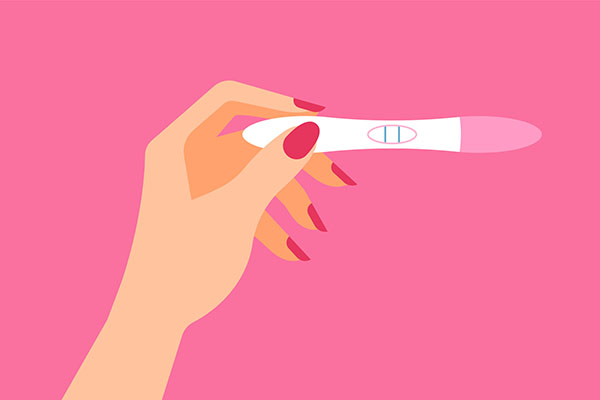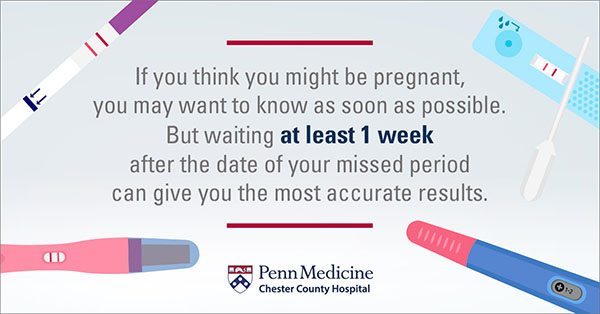
When you're standing in the store looking at the different pregnancy tests, you may find yourself with a lot of questions, wondering which brand is the most accurate or reliable or how to read the results correctly. You might ask yourself when is the best time to take a pregnancy test, and if it's true that you get more accurate results in the morning.
It's normal to have a lot of questions when you think you may be pregnant. It can be helpful to learn more about your options before you're standing in the store wishing you had enough cell phone service for a quick Google search.
To help you feel confident about taking a pregnancy test, learn more about how they work — and what to do after taking one.
How Long Should I Wait Before Taking a Pregnancy Test?
"If you think you might be pregnant, you should test the first day after your missed period," says Amy Latyak, BSN, RN, CCE, CBC, Childbirth Education Program Coordinator at Chester County Hospital. "But it's important to keep in mind that if you take a pregnancy test too early, the results may not be as accurate, and you may get a false negative (meaning the test says you’re not pregnant when you really are)."

Which Pregnancy Test Should I Use?
When it comes to buying a pregnancy test, you might feel overwhelmed by the sheer number of options. You can look online at different reviews, or ask a loved one if they have a test they recommend.
It's important to choose a test that is sensitive enough to detect pregnancy early on — and that has clear instructions for use. No one wants to read through confusing instructions when all you want is a simple answer. Some tests offer additional features, like digital displays or the ability to test earlier than other brands. Think about what features you actually need and what your budget may be when choosing a test for you.
What Are the Different Types of Pregnancy Tests?
There are two main types of pregnancy tests: urine tests and blood tests. Urine tests are the most common and can be purchased over the counter at a pharmacy or grocery store. "This is typically the first kind of test you will take, because you can do it in your own home without making an appointment," Latyak notes.
Blood tests, on the other hand, must be done at your doctor's office — though this kind of test is much less common. While they can detect pregnancy earlier than a urine test, you often have to wait longer for the lab to return your result and may have to pay more out of pocket than you would for an over-the-counter urine test.
How Does a Pregnancy Test Work?
Throughout pregnancy, your body changes in many different ways, from the shape of your breasts to the hormones in your body. During the first two and a half months of pregnancy, one specific hormone called human chorionic gonadotropin (hCG) increases significantly.
Both urine and blood pregnancy tests measure the amount of hCG in your body to produce either a positive or a negative result. This is why if you take a pregnancy test too early, your body may not have produced enough hCG for the test to detect.
When Is the Best Time of Day to Take a Pregnancy Test?
You may be able to get more accurate results depending on the time of day. For example, taking a pregnancy test in the morning when there is more hCG in your urine, may give you a more accurate result. But today's pregnancy tests are very sensitive and can detect pregnancy hormones even in low concentrations.
How Accurate Are At-Home Pregnancy Tests?
At-home pregnancy tests are very sensitive to the changing hormones in your body, so they can be very accurate. In fact, when the instructions are followed correctly — including waiting enough time to take it and collecting the sample properly — at-home pregnancy tests are 97 to 99% accurate.
What Should I Do Next if My Pregnancy Test Results Are Positive?
After receiving a positive pregnancy test result, you may feel a wave of different emotions. You may be excited or nervous. You may be happy or worried. You may want to tell everyone you know or you might want to keep it a secret for a while.
"Regardless of your initial emotions, it's important to schedule an appointment with an OB/Gyn doctor or family practice doctor, since it can take a few weeks or so," says Latyak. "During this first appointment, they can confirm your pregnancy and talk to you about the next steps."
Your Chester County Hospital provider can offer guidance on prenatal care, make referrals to other healthcare providers, answer any questions you may have, and help you make informed and confident decisions about your pregnancy.
Get Answers to Your Pregnancy Questions!
Chester County Hospital supports new parents through pregnancy, birth, and beyond. Learn more about the Parent Wellness Network and other Childbirth Education Programs at Chester County Hospital.